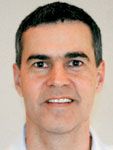- Case-Based Roundtable
- General Dermatology
- Eczema
- Chronic Hand Eczema
- Alopecia
- Aesthetics
- Vitiligo
- COVID-19
- Actinic Keratosis
- Precision Medicine and Biologics
- Rare Disease
- Wound Care
- Rosacea
- Psoriasis
- Psoriatic Arthritis
- Atopic Dermatitis
- Melasma
- NP and PA
- Skin Cancer
- Hidradenitis Suppurativa
- Drug Watch
- Pigmentary Disorders
- Acne
- Pediatric Dermatology
- Practice Management
- Prurigo Nodularis
- Buy-and-Bill
Article
When patients approach politics, responding carefully can be crucial
Author(s):
Politics is a popular but touchy subject. We wondered whether dermatologists' patients are raising the issue of healthcare reform during visits, and, if so, how the derms are handling those questions.

Key Points

Political views may have absolutely nothing to do with the medical care a doctor provides, but since political discussions can get a bit emotional and vehement, they could erect barriers between doctor and patient if their views don't coincide.

Robert S. Purvis, M.D., who practices in Myrtle Beach, S.C., says a lot of patients ask, but they are fairly careful about how they approach the issue, too.
"It's usually a general question about what I think about the new healthcare plan, and I give them a very general answer. 'We've been concerned about healthcare delivery in the past and so far things haven't gotten extremely bad - we're still able to keep the lights on and pay the bills.'"
Approach with caution
A practitioner for 15 years, Dr. Purvis says it isn't always easy to respond.
"I really don't know what to think. It might be a little shortsighted not to consider the long picture. I tell patients they have to take it day by day, and take time to call their congressman and support the legislation that favors our specialty. I tell them there is cause for concern, but the bill is so lengthy and complicated it's difficult to be able to dissect and form an opinion about.
"Although I don't belong to the AMA (American Medical Association) because I don't agree with all of their policies, I do go along with some of their ideas as far as supporting certain legislation."
In Margate, Fla., Brad P. Glick, D.O., M.P.H., says his patients frequently ask him, and his staff, about reform.
"They often make statements, hoping to get a response from me. Many will say they're fearful and they're concerned healthcare won't be the same.

Dr. Glick belongs to a 35-member, single-specialty group and is program director of the Wellington Regional Medical Center/Lake Erie College of Osteopathic Medicine dermatology residency training.
"I also hear from patients who feel that healthcare is a God-given right, no matter what the cost. So many people lost their jobs this year, lost their insurance, and they figure if there had been national health insurance, they would either be in that already, or if they lost their job they would be able to immediately shift to national health insurance," Dr. Glick says.
"How I respond depends on their perspective. Sometimes they want to know what I think of national health insurance and I think most physicians feel that becomes a little uncomfortable. I try to answer those types of questions with what I feel is appropriateness.
"My belief may be different than some, but I believe the system needs to be tiered, and that there needs to be some better national system of healthcare so all Americans can have some insurance. Not everyone can work. Not everyone has a job. There's always going to be some degree of unemployment, albeit hopefully it will be much better than it has been for the past year.
"Sometimes I just try to diffuse the conversation, it so it doesn't become tense in the office."






